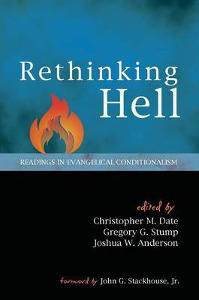Earlier this month I spoke at the annual conference of the Conditional Immortality Association of New Zealand, on divine holiness and hell. Defenders of the doctrine of eternal torment sometimes assure us that eternal torment in hell is necessary because God is very, very holy. But a biblical theology of God’s holiness actually offers no support at all to this view on hell. In fact, God’s holiness as depicted in the Bible offers more support for the doctrine of annihilationism – the view that God will finally remove all evil and those who commit it from creation. If you have 25 minutes to spare, take a listen!
Tag: hell Page 1 of 2

Those who believe in Jesus “will not die forever,” unlike those who will. Even Aquinas agrees!
A while ago I wrote a post explaining that many Bible translations get John 11:25-26 wrong. They quote Jesus as saying “whoever lives and believes in me will never die.” This gives some people the impression (rightly or wrongly) that if you are a believer in Jesus, even when your body dies, you keep living because you go to heaven, continuously enjoying the eternal life that has already begun. As I explained (and you should read that post if this sounds strange to you), οὐ μὴ ἀποθάνῃ εἰς τὸν αἰῶνα is correctly translated not as “will never die,” but rather “will not die forever.” If you believe in Jesus, you won’t suffer the fate of dying forever. This is not a claim that you won’t die ever, but rather that you won’t die forever. You will die one day, but will be spared the fate of the lost, which is a final and irrevocable death, never to live again.

There is a way of using the Bible to support your theology that really just amounts to doing everything in your power to avoid what the Bible has to say so that you can escape from the ravages of Scripture with your precious doctrine still intact.
Without naming names, over the last year I have had several conversations about the doctrine of hell with people who advocate the doctrine of eternal torment, where they argued in a manner very much like John in the following conversations (right down to the same phraseology, eg “equally likely as an interpretation” and “use Scripture to interpret Scripture”):
Karen: Hi John. Have you read passage A? It seems to pretty clearly deny the doctrine of eternal torment. It says that one day the lost will be destroyed. They will die and be gone. Don’t you agree?
John: No, I don’t think so. I think eternal torment is equally likely as an interpretation.

Based on the evidence currently available, we should view Pope Francis as an annihilationist, and attempts from within the Vatican to downplay this fact are unconvincing. The current Pope does not believe the doctrine of eternal torment, affirming instead the biblical doctrine of conditional immortality: That the saved will have eternal life, but the lost will not live forever – not in hell or anywhere else.

What would you think if I offered to reward you by killing you? Would you think I was mad? Suppose that I was a well-known preacher who had steadily grown in popularity, so that I now pastored a large church, wrote and sold many books, was keynote speaker at conservative conferences and so on. And then one day I told, not just you but the whole world, that for people who don’t know Jesus to be annihilated forever would actually be a reward, throwing in a claim that really, it’s what they want anyway? Of course it would be just as mad as the person who thought that killing you would be a reward, but you might look at my rise in popularity and influence and wonder at just what point I crossed the line where I would think that this was a healthy thing, not just to believe, but to tell the world.
Not long ago, John Piper tweeted thus:

Life is worth nothing. Having eternal life is worth nothing. Nothing at all. Enjoying eternity with God is not something to be prized, so if you lose it, you have lost nothing. No big deal. It has no value. If you lost your life, or you had the chance of eternal life taken from you (when it is actually a real possibility), then you have lost nothing at all. Zip.
If you tell anybody that this is not so, then you’re not a real Christian, but a phony. If you deny these things, then you’re accursed. You must tell people that these things are true, because if you tell them anything else, you’re not being loving. You’re just letting them die in their sins. If you want to be faithful to God, then you must tell people that their lives are worthless, and that there is no value in eternal life. This is an essential part of defending the Gospel.
Of course none of that is true. It is bizarre, false, and certainly not a view that I would ever call biblical or Christian. And yet, I have just read an article by the head of a major Evangelical apologetics organisation in which he claimed all of these things.

The traditional doctrine of hell is surely a major liability in the task of Christian apologetics. At the least, the tension between proclaiming the goodness and love of God should give you a reason to ask afresh whether or not he will cause the eternal suffering of human beings.
Podcast: Play in new window | Download
What did the early Church Fathers have to say about the doctrine of eternal punishment?
Every now and then I make a video for Rethinking Hell, and I’ll share some of those here as they are produced. The purpose of this one was to provide a succinct reply to the comment that is sometimes made that the doctrine of hell as a place of eternal torment is the view that all the Early Church Fathers held. I hope you find it interesting!

